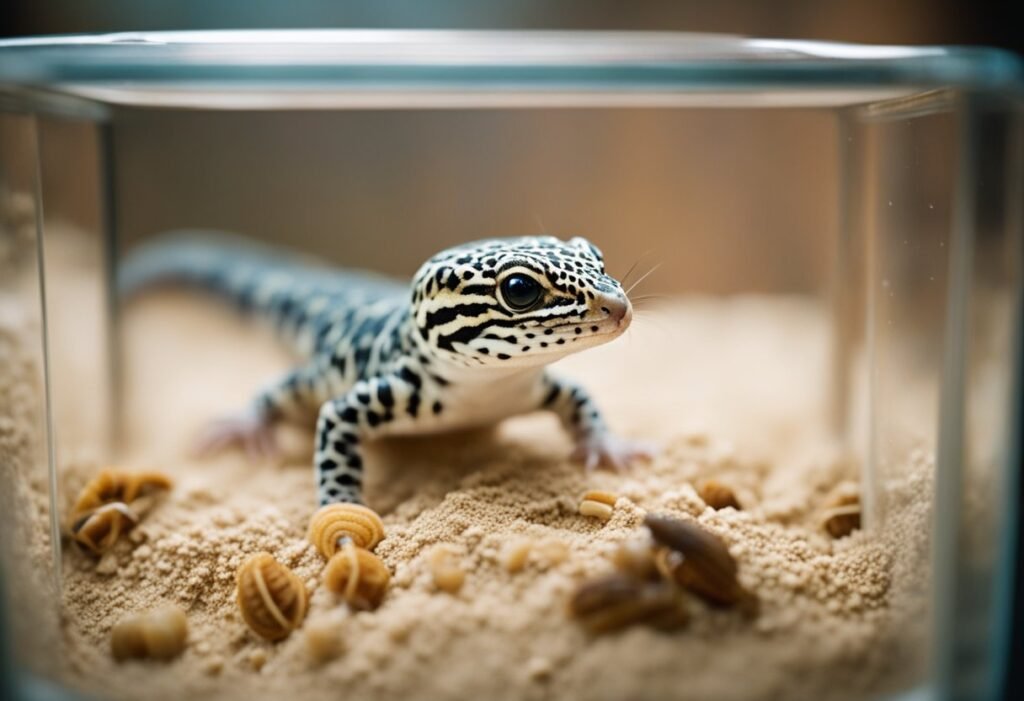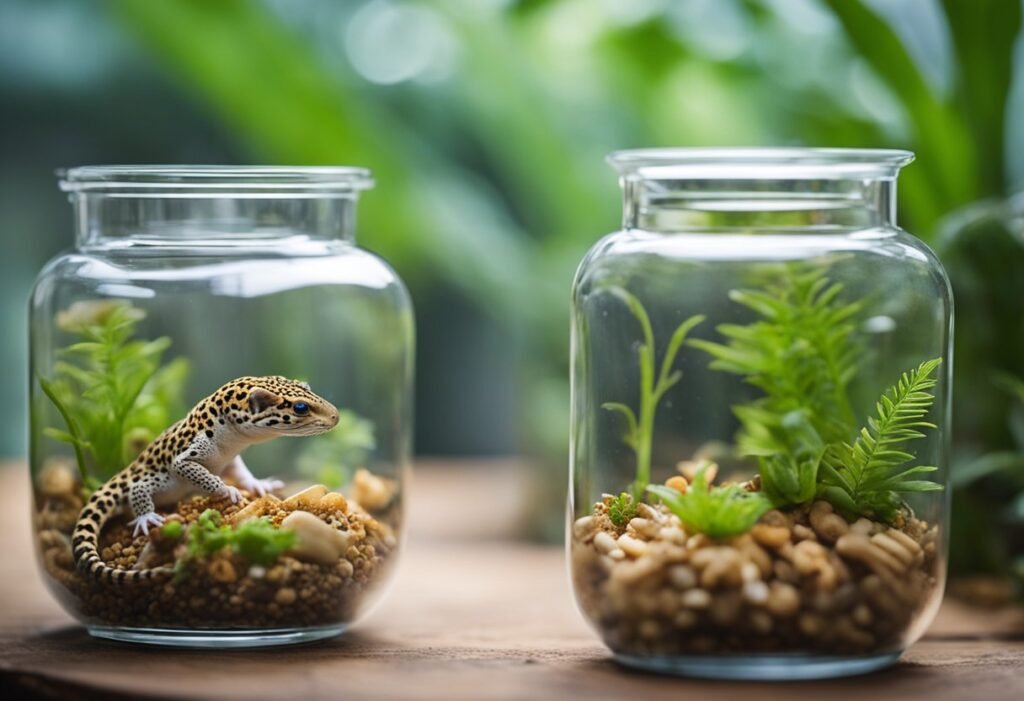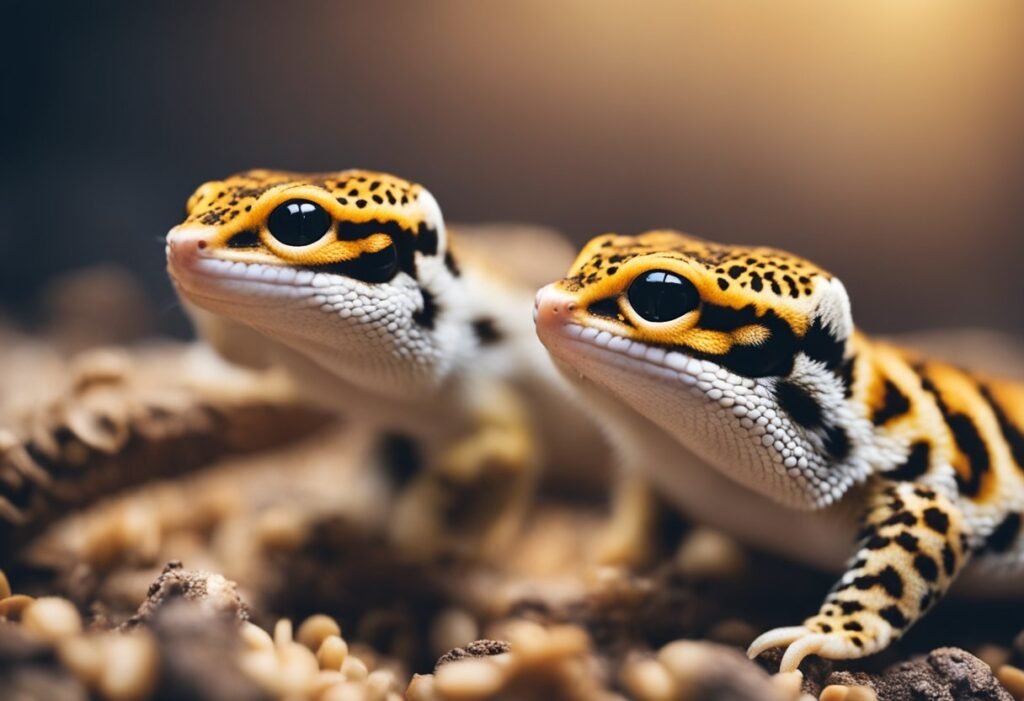Leopard geckos are popular pets among reptile enthusiasts due to their unique appearance, docile nature, and low maintenance requirements. As with any pet, it’s important to provide proper nutrition to ensure their health and well-being. One common question that arises is whether baby leopard geckos can eat mealworms.
Mealworms are a popular food choice for leopard geckos, as they are high in protein and relatively easy to obtain. However, it’s important to note that baby leopard geckos have different nutritional requirements than adults. In this article, we will explore whether or not it is safe and appropriate to feed mealworms to baby leopard geckos, and provide some alternative feeding options for those who prefer to err on the side of caution.
Dietary Basics for Baby Leopard Geckos

As responsible pet owners, we must ensure that our baby leopard geckos receive a balanced and nutritious diet to support their growth and development. Here are some essential dietary basics that we should keep in mind when feeding our baby leopard geckos.
Nutritional Requirements
Baby leopard geckos require a diet that is high in protein and low in fat. They also need a variety of vitamins and minerals to maintain good health. One of the best ways to meet their nutritional requirements is by feeding them live insects.
Mealworms are a popular choice of food for baby leopard geckos. They are a good source of protein and are relatively easy to find at pet stores. However, it is essential to ensure that the mealworms are gut-loaded before feeding them to our geckos. This means that they should be fed a nutritious diet for at least 24 hours before being offered to our geckos.
We should also dust the mealworms with a calcium and vitamin supplement to ensure that our geckos receive the necessary nutrients. It is recommended to dust the mealworms once or twice a week.
Appropriate Prey Size
When feeding baby leopard geckos, it is crucial to offer them appropriately sized prey. The prey should be no larger than the space between the gecko’s eyes. Feeding them prey that is too large can cause impaction, which is a severe health problem that can be fatal.
As our baby leopard geckos grow, we should gradually increase the size of the prey that we offer them. This will help to ensure that they receive enough food to support their growth and development.
In conclusion, feeding our baby leopard geckos a balanced and nutritious diet is essential for their overall health and well-being. By following these dietary basics, we can help to ensure that our geckos receive the necessary nutrients to thrive.
Mealworms as a Food Source

As leopard geckos are insectivores, it is important to provide them with a variety of insects to ensure they receive a balanced diet. One common insect feeder that is often fed to leopard geckos are mealworms.
Benefits of Mealworms
Mealworms are a good source of protein and can be a nutritious addition to a leopard gecko’s diet. They are also relatively easy to find and are available at most pet stores. Additionally, mealworms can be stored for a longer period of time compared to other feeder insects such as crickets, making them a convenient option for leopard gecko owners.
Potential Risks
While mealworms can be a good source of nutrition for leopard geckos, there are also potential risks to consider. One issue is that mealworms have a hard exoskeleton that can be difficult for leopard geckos to digest. This can lead to impaction, a condition where the digestive system becomes blocked and can be potentially fatal. It is important to ensure that mealworms are not the sole source of food for leopard geckos and that they are fed in moderation.
Another risk is that mealworms can carry parasites or bacteria that can be harmful to leopard geckos. It is recommended to purchase mealworms from a reputable source and to thoroughly clean them before feeding them to your leopard gecko.
In conclusion, while mealworms can be a nutritious addition to a leopard gecko’s diet, it is important to be aware of the potential risks and to feed them in moderation. Providing a variety of feeder insects and ensuring they are from a reputable source can help ensure the health and well-being of your leopard gecko.
Feeding Procedure

When it comes to feeding baby leopard geckos, mealworms are a popular choice. However, it is important to follow a proper feeding procedure to ensure the health and wellbeing of your gecko. In this section, we will discuss the frequency of feeding and how to prepare mealworms for feeding.
Frequency of Feeding
Baby leopard geckos should be fed daily, as they require a high protein diet to support their growth and development. It is recommended to feed them 2-3 appropriately sized mealworms per feeding. As they grow older, you can gradually increase the size and amount of food they consume.
Preparing Mealworms for Feeding
Before feeding your baby leopard gecko, it is important to properly prepare the mealworms. Here are the steps to follow:
- Purchase live mealworms from a reputable source.
- Place the mealworms in a container with a small amount of oatmeal or wheat bran. This will provide them with the necessary nutrients and prevent them from crawling out of the container.
- Keep the container in a cool, dark place, such as a pantry or closet. Mealworms prefer temperatures between 70-80°F.
- Before feeding your gecko, remove a few mealworms from the container and place them in a separate feeding dish. Do not feed your gecko directly from the container, as this can lead to impaction.
- If your gecko does not eat all of the mealworms within 15-20 minutes, remove the remaining worms from the dish to prevent them from crawling around the enclosure.
By following these simple steps, you can ensure that your baby leopard gecko receives a healthy and nutritious meal. Remember to always provide fresh water and a clean enclosure to promote a happy and healthy gecko.
Monitoring Your Gecko’s Health
Signs of Proper Nutrition
As responsible pet owners, we want to ensure that our baby leopard geckos are getting the proper nutrition they need to grow and thrive. One of the best ways to monitor their health is to observe their behavior and appearance. Here are some signs that your gecko is getting the proper nutrition:
- Active and alert: A healthy gecko should be active and alert, moving around their enclosure and showing interest in their surroundings.
- Good body condition: A gecko that is getting the right amount of food should have a plump, rounded tail and a healthy weight.
- Shedding properly: Proper nutrition helps ensure that your gecko sheds their skin smoothly and without any issues.
- Bright, clear eyes: A gecko with bright, clear eyes is a sign of good health.
Common Dietary Issues
While feeding your baby leopard gecko mealworms is generally a good choice, there are some dietary issues that can arise. Here are some things to watch out for:
- Overfeeding: Feeding your gecko too many mealworms can lead to obesity and other health issues. Make sure to follow a feeding schedule and monitor their weight.
- Impaction: Mealworms can be difficult for geckos to digest, especially if they are fed too many. Make sure to provide a shallow dish of water and monitor their bowel movements.
- Nutritional deficiencies: Feeding only one type of food can lead to nutritional deficiencies. Make sure to offer a variety of food items, such as crickets and waxworms, to ensure a balanced diet.
By monitoring your baby leopard gecko’s health and addressing any issues that arise, you can help ensure that they live a long and healthy life.
Supplementation and Variety
When it comes to feeding baby leopard geckos, it is essential to provide them with a balanced diet that includes a variety of insects and supplements. Here are some tips on how to ensure your baby leopard gecko is getting the nutrients they need.
Calcium and Vitamin Supplements
Calcium is crucial for the healthy growth and development of baby leopard geckos. Without adequate calcium intake, they can develop metabolic bone disease, which can be fatal. To ensure your baby leopard gecko is getting enough calcium, you can dust their mealworms with a calcium supplement powder. We recommend using a calcium powder that also contains vitamin D3, as this helps with calcium absorption.
It is essential to avoid over-supplementing your baby leopard gecko with calcium, as this can lead to other health problems. We recommend dusting their mealworms with calcium powder once or twice a week, depending on their age and size.
Incorporating Other Insects

While mealworms are a staple food for baby leopard geckos, it is essential to provide them with a variety of insects to ensure they are getting a balanced diet. Some other insects you can feed your baby leopard gecko include crickets, dubia roaches, and waxworms. Each insect has its own nutritional benefits, so incorporating a variety of insects into your baby leopard gecko’s diet can help ensure they are getting all the nutrients they need.
It is important to note that some insects, such as waxworms, should only be fed as a treat and not as a staple food. Waxworms are high in fat and low in nutrients, so feeding them too often can lead to obesity and other health problems.
In conclusion, feeding baby leopard geckos a balanced diet that includes a variety of insects and supplements is essential for their health and well-being. By following these tips, you can ensure your baby leopard gecko is getting all the nutrients they need to thrive.
Frequently Asked Questions
What is the ideal diet for a baby leopard gecko?
A baby leopard gecko’s diet should consist of mainly insects. The ideal insects for baby leopard geckos are small and soft-bodied, making it easier for them to digest. Some recommended insects for baby leopard geckos include small crickets, mealworms, waxworms, and silkworms.
How often should baby leopard geckos be fed mealworms?
Baby leopard geckos should be fed every day, and mealworms can be included as part of their diet. However, it is important to ensure that the mealworms are not the only food offered to the baby leopard gecko, as a varied diet is necessary for their health.
What quantity of mealworms is recommended per feeding for a baby leopard gecko?
A baby leopard gecko can be fed 2-3 small mealworms per feeding, depending on the size of the gecko. It is important not to overfeed the gecko, as this can lead to obesity and health problems.
Is it harmful to exclusively feed mealworms to a leopard gecko?
Yes, it is harmful to exclusively feed mealworms to a leopard gecko. Mealworms are high in fat and lack some essential nutrients that a leopard gecko needs for optimal health. A varied diet that includes other insects and occasional treats such as fruits or vegetables is necessary for the gecko’s health.
What are the signs of a healthy baby leopard gecko?
A healthy baby leopard gecko should have clear eyes, a plump tail, and a good appetite. They should be active and curious, with no signs of lethargy or lack of energy. Their skin should be smooth and free of any bumps or lesions.
What alternative foods can be offered to leopard geckos apart from insects?
Apart from insects, leopard geckos can be offered occasional treats such as fruits or vegetables. Some recommended fruits and vegetables include mango, papaya, carrot, and sweet potato. However, these should not be the main part of the gecko’s diet, and should only be offered in small amounts as treats.





